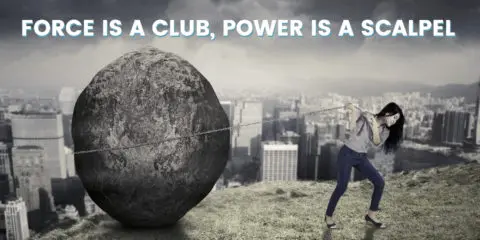Force: (n) strength or power exerted upon an object; physical coercion; violence; intensity
Power: (n) the ability to do or act; capability of doing or accomplishing something
Energy: (n) the capacity for vigorous activity; available power
Leverage: (n) the mechanical advantage or power gained by using a lever, a rigid bar that pivots about one point and that is used to move an object at a second point by a force applied at a third
Have you ever tried to muscle through something where you lacked requisite skill?
I took up rowing exactly one year ago. I was immediately taken by the precision, the discipline, the punishment, and the reward of it. We learned to go fast, and I fell head over heels in love. Last month, with a moxie-infused flourish of a keystroke, I signed up for the women’s competitive team tryouts. Let me be clear: I had zero business doing this. I am a novice, and these women are good. I mean, really, really, winning-medals-in-internationally-fielded-regattas good.
And then there is me. Little Miss Novice. But, hey, go big, or go home, right?
Team members are selected by the coach on the basis of three things: strength and power (check!), attitude and energy (check!), and rowing technique (yeah, so, about that…). But somehow I made it! I actually made the team. The coach saw something in my novice hacking, and my butt landed in a seat.
There was no question in my mind that the real work wasn’t getting on the team, it was staying on the team. Show up, shut up, do the work. Get better, and deserve to be there. Every damn day.
At practice a couple of weeks ago, as the sun was rising over the Charles River, the boats up to race each other for the first time. Three boats of 1,500 pounds of determination, grit, and (with the exception of me) talent barrelling down these hallowed rowing waters. I was hanging on to my oars by my fingernails, but my inner voice was cackling “Squeeee!” the entire time. Drop the blade, push the boat, up to the catch, and again! Catch, send, finish!
After practice, I asked the coach for some feedback. She said, “It’s clear that you are full of strength and energy. What you need to work on is patience.”
Well, if that isn’t the story of my life, I don’t know what is.
It got me thinking about how we muscle through the hard things, how we use our blunt force when we don’t have the finesse or skill or patience that allows us to realize and leverage our true power. Any time I’ve tried something new, my first, second, and third approach has always been force.
And, therein, crammed between my desire to make it happen and my ability to make it happen, I get stuck.
Rowing is, at its core, a mental mindfuck of the most exquisite variety. You have to go slow to go fast. It is a sport of centimeters, precise movements, and imperceptibly small changes that all lead up to enormous differences. Force gets you nowhere; it is a blunt instrument, a club. Force is always met with equal resistance, and so the harder you fight the boat, the harder it fights back. Power is everything; it is a scalpel. It is consonance, while force is dissonance.
And it is like that in so many aspects of life. When things aren’t going our way, we resist, digging deeper and fighting harder. Whether it is an entrenched battle with a family member or a conflict with a colleague, we hunker down, muscle through, and usually just keep doing the same thing, just more and more intensely. And we become frustrated, mystified, disappointed (and really fucking tired) when it doesn’t work.
What if we stopped resisting so much? What if we put down the blunt instrument of force and chose the scalpel of power?
In rowing, we run drills to take apart every piece of the stroke to make a dozen tiny yet meaningful changes, all of which add up to major improvements in efficiency and speed. That’s hard. Harder for me, though, is accepting that the most progress happens by getting better bit by bit rather than muscling through and improving by sheer force of will.
What if, in our work and home lives, we did the same thing, taking apart those processes and relationships where we are stymied, improving each piece bit by bit, a little each day? What if, instead of simply applying more force, we stopped for a moment and considered how we might alternatively apply more power? What if we slowed down to speed up?



